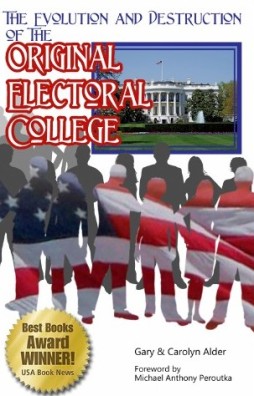A Page from Our Book
Page 82 – No Independent Electors Allowed
Having achieved their ends in the election of president/vice-president teams and making the whole process subject to party rule (unofficially of course), the political parties continued to secure their stranglehold on American politics. In the first years following the ratification of the 12th Amendment, there is evidence that at least in theory, if not in practice, the concept of the intellectual independence of presidential Electors still prevailed. William Rawle demonstrates the discrepancy between theory and practice in this matter as early as 1829. He states:
It must however be acknowledged that in no respect have the enlarged and profound views of those who framed the constitution, nor the expectations of the public when they adopted it, been so completely frustrated as in the practical operation of the system so far as relates to the independence of the Electors.
It was supposed that the election of these two high officers would be committed to men not likely to be swayed by party or personal bias, who would act under no combination with others, and be subject neither to intimidation or corruption. …
… experience has fully convinced us, that the Electors do not assemble in their several states for a free exercise of their own judgments, but for the purpose of electing the particular candidate who happens to be preferred by the predominant political party which has chosen those Electors. In some instances the principles on which they are chosen are so far forgotten, that Electors publicly pledge themselves to vote for a particular individual, and thus the whole foundation of this elaborate system is destroyed. (A View of the Constitution – Rawle p. 57-58)
The Constitution carefully put checks in place to prevent the national government from influencing the outcome of the presidential nomination and election process. This is what Rawle’s phrase “the independence of the Electors” refers to. Since political parties were not an official part of government, no checks could be put in place to protect against parties. The integrity of the people acting as individuals and groups would have to suffice. If the people were more interested in electing a particular politician than in maintaining a carefully designed system to provide statesmen for office time after time, the will of the people would prevail. If people were more determined to further only their own interest, at the expense of the interests of other individuals and groups, no legislation or constitution could change that tendency. The Framers only put checks in the Constitution that would control the government. Judging from Mr. Rawle’s quote, the nation abandoned constitutional principles for party politics soon after the Constitution was adopted.
The idea of an independent Elector actually pondering which individuals are most qualified to be President is so foreign to us today that it is not even considered an option. The nomination function of presidential candidates today has been entirely turned over to the political parties. The Electors’ votes are now predetermined by the popular vote. What a farce! The current winner-take-all system awards the electoral votes of the state to the winner of the state popular vote. This effectively makes the presidency a prize to be won. The soldiers in this war are out to “capture” the White House.
Neither the original Constitution nor the 12th Amendment authorizes a popular vote for President. Most Americans look at the electoral system as a hindrance to a popular vote. If the electoral vote goes contrary to the popular vote, they cry “foul!” and threaten to “fix” the problem by doing away with the Electoral College so that it will not interfere with the popular vote. Currently there is a movement called the National Popular Vote compact designed to circumvent the Electoral College and to elect the President directly—without amending the Constitution. Several states have already passed laws that will award all of their state’s electoral votes to whichever candidate wins the nation-wide popular vote.
The National Popular Vote compact (NPV) only changes the criterion for awarding the prize in each state. The popular vote totals in the nation are used rather than the popular vote totals from the state.
The Two-Party System
It is often said that this nation was built on a two party system. There is no evidence in the Constitution of that. In fact there is no mention or reference to parties in the original Constitution. The closest things to parties mentioned in the Constitution are the states. Many of the colonists came from England where the Whigs and the Tories battled it out in a party system. It was only natural for them to superimpose the past on the evolution of the electoral system. At any rate, a two party system did become the de facto standard. Modifications to the system came first in practice, then by statute; and were designed to accommodate party politics.


